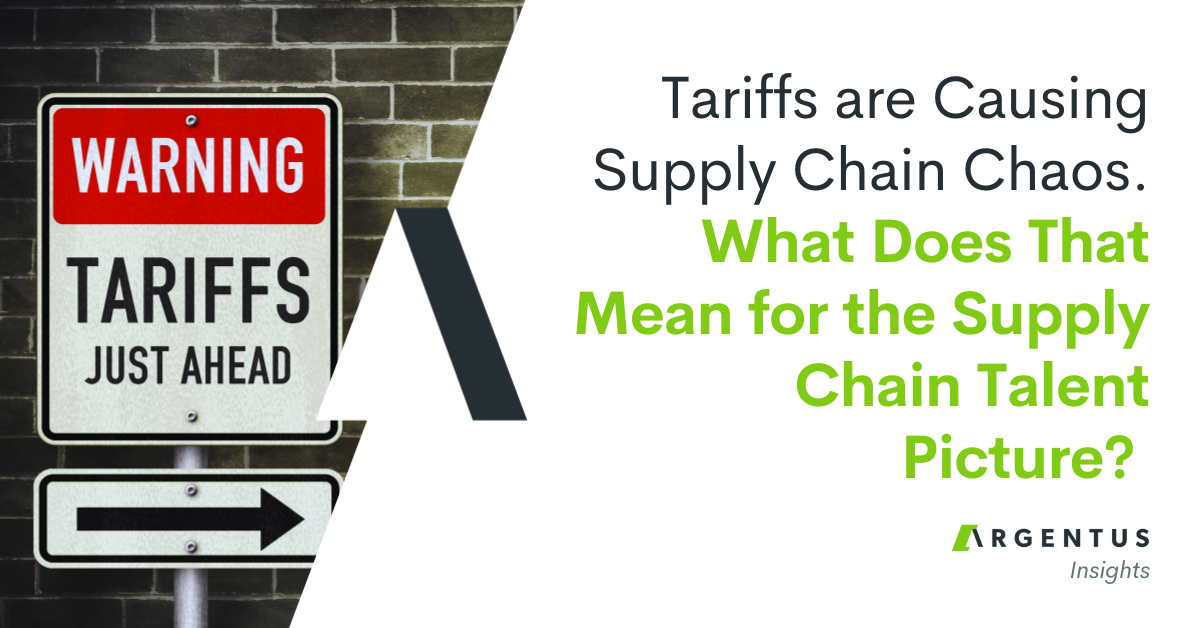Over the past several weeks, Argentus has been publishing high-level discussions with some of the supply chain field’s top executives and senior professionals on our blog about the state of the talent landscape in supply chain, planning, and other related disciplines. We’ve covered perspectives from electronics manufacturing, consumer goods, food production, apparel, and other industries, with a special focus on hiring challenges that executives face when trying to build great supply chain and procurement teams, as well as technological changes in the field. We’ve also had some interesting discussions with industry professionals about sustainability and cost savings in supply chain.
This week, we bring you the first part of our interview with Steven Forth. Steve is a seasoned supply chain executive with subject matter expertise in strategic sourcing and extensive experience in financial services, retail, and health care. He’s currently the VP of Strategic Sourcing at one of Canada’s leading health care procurement organizations, and we found his feedback about top issues for talent in strategic sourcing invaluable. In our interview with Steve, he shared professional insights regarding what organizations are looking for when hiring in strategic sourcing, the key differences between a transactional and strategic approach to procurement, and how candidates can build better strategic procurement skills.
Transactional vs Strategic Procurement, Industry Accreditation
When it comes to specific pain points for hiring in strategic sourcing, Forth says, “Strategic sourcing was something unheard of when I got started 25 years ago. It was a brand new concept, the idea that there’s a very real and present business consideration within the procurement process that didn’t normally get factored into the equation. Therefore, those individuals that get the wider business strategy, that find a way to connect procurement strategies and decisions to the way the business is actually viewed and driven at the C-suite just aren’t that easy to come by.”
“The biggest challenge,” says Forth about hiring for strategic sourcing, “Is that even though the most recognized purchasing and supply chain accreditation organizations offer a certificate, they are very much tactical training programs. Many organizations make it a point of criteria when hiring somebody at senior levels, but an accreditation has no bearing on the ability to offer strong business advice.”
According to Forth, a buyer with a transactional accreditation and mindset has a disadvantage at the negotiation table. “The person sitting across from the buyer is not transactional, they are strategic,” says Forth. “They spend their career learning skills and cultivating experiences that help them win more profitable business for their company. Buyers, on the other hand, get certified in processing purchase orders. That’s a big difference. Buyers don’t get the C-suite respect because they don’t meet the criteria that the C-suite officers are looking for, hence the common complaints from purchasing professionals that they don’t receive enough respect.”
What Strategic Sourcing Executives Look For During the Hiring Process
“Tomorrow’s leaders of supply chain and sourcing are really at the junior levels today,” says Forth. “Personally, I’ve removed the demand for a specific accreditation. I go after people with business smarts who have a more holistic understanding of the skills of the trade. If they have the ability to see the company vision, connect the dots, place the nails, cut the boards, and be bigger and better than the flat out design, that’s somebody that’s truly adding a benefit to the process.”
For Forth, procurement professionals who are able to take a big picture view and offer strategic advice to a business beyond simply transactional procurement are extremely valuable, but also difficult to find. We asked him how he’s able to identify this talent in the hiring process, even in an individual whose background is mostly in transactional procurement.
“Whenever I go through the interview process, it becomes very apparent that there are certain people who just get it,” says Forth. “You can tell it by how they reason their answers to the questions, how they relate with the team. I do a team interview, trying to get to the guts of who the person is. You’ve got one set of facts and figures on a resume, but the proof is in the exchange you have in the room and how a person handles themselves. My favorite word for somebody like that is someone who has wherewithal. Another key concept which is sometimes overused but very applicable is business acumen—in this situation, it really has merit.”
In Forth’s opinion, the ability to be great at strategic sourcing often comes down to an individual’s capacity to create opportunities for process improvement, even if that professional has cut his or her teeth in a more transactional procurement role.
“For example, one individual we hired came from a very transactional environment with his previous employer,” he says. “He expressed frustration with things he had hoped to improve, and I pursued the opportunity to have him explain what he would have liked to improve. Through the course of that dialogue he was able to express to the team in a succinct manner something that made perfect sense. So that guy got hired. Not just because of that, but the moment was indicative of his overall potential.”
________________________________________________________________________________________________________
We hope you enjoyed this discussion with Steven Forth. Check back on the Argentus blog soon for the second part our interview with him, where Steve delves into the distinctions between public and private sector strategic sourcing, if there’s a supply chain talent deficit, as well as which industries he thinks are producing the top strategic sourcing talent.




0 Comments